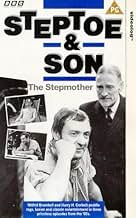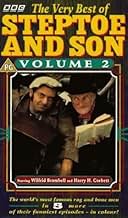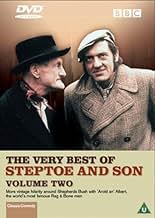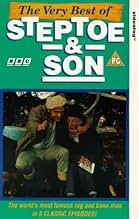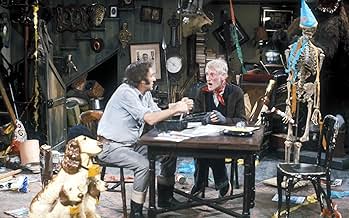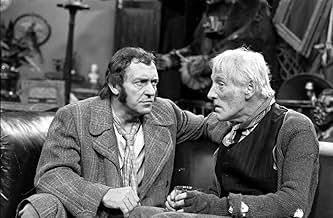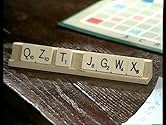IMDb-BEWERTUNG
7,8/10
3577
IHRE BEWERTUNG
Füge eine Handlung in deiner Sprache hinzuBritish sitcom about a father-and-son rag-and-bone business in London. The intergenerational divide between the miserly Steptoe and his ambitious son results in comedy, drama, and tragedy.British sitcom about a father-and-son rag-and-bone business in London. The intergenerational divide between the miserly Steptoe and his ambitious son results in comedy, drama, and tragedy.British sitcom about a father-and-son rag-and-bone business in London. The intergenerational divide between the miserly Steptoe and his ambitious son results in comedy, drama, and tragedy.
- Auszeichnungen
- 2 wins total
Folgen durchsuchen
Empfohlene Bewertungen
A brilliant exercise in British comedy from the sixties and seventies ! Not one episode fails to please and the dialogues were extremely savoury. A certain number of episodes are available on BBC dvds in the UK region 2. The picture quality of the latter episodes is so good that you'd swear they'd been made yesterday. It is hard to believe that both of these characters have sadly left us but thanks to this series they will live on forever in our hearts and minds ! It appears that in real life, Wilfred Brambell was an exceedingly well-spoken man and didn't have a common accent at all. In one of the episodes involving Harold acting in a play, we do in fact hear Albert speak in a very posh voice albeit very briefly.
Steptoe & Son (SS), was a national institution back in the 60s & 70s. There were huge TV audiences all clamouring to watch the latest episode in the lives of two lonely but dependent rag & bone men in Sheperds Bush, London.
So big were the audience figures at around 7pm at night that even the-then Prime Minster, Harold Wilson, had to postpone a General Election campaign because it clashed with this hugely popular show.
Harold is the middle aged son, frustrated with his boring job as a "totter" and being constantly tied down by his irritating and manipulating father.
Harold is a dreamer, a person who sees himself as an intellectual, a poet, an classical actor, a gentleman, a ladies man and sucessful businessman....and yet this is just his little dream, the kind of dream we all wish for. But in Harold's mind only his father is really holding him back from making those dreams a reality.
Albert, on the other hand, has seen it all. He is a bitter old man who was brought up in a poor family and life was tough, especially having to suffer going through two world wars. He also realises that he never made a success of his life in a business sense. After decades of being a rag & bone man he is still no richer than his own father was.
But to add to this bitterness, he is also scared of being left totally alone in an uncaring modern world. He no longer has a wife, no daughters, hardly any family at all to fall back on. The only person he can really trust & depend on is his son, Harold. And Albert will do anything to ruin Harold's chances of either bettering his own life elsewhere or making sure he never leaves him to fend for himself.
And so for the next 12 years British audiences peeked into the daily lives & scrabbles of this odd couple with Harold trying to escape to a better world and Albert making sure he doesn't.
The scripts remained consistantly good throughout this era of new comedy. Boundaries of acceptable taste during this time were pushed ever further and the onset of moderately bad language from these two gents became common place.
Some purists saw it as vulgar, crude and the thin end of the cultural wedge, while the majority felt it was nothing more than how life in the real world is portrayed, and that is probably one reason why it was so successful, because we could all empathise with the two characters as they struggle for their own particular hopes & dreams.
It should be added that in real life both lead actors, Wilfred Brambell & Harry H Corbett slowly began to hate each other just as much as the characters they portrayed in the show. Brambell was very much a refined gentleman in real life and usually was very dismissive of the poor and working class (which is the great paradox of his own character).
At the same time Harry H Corbett felt he had become for-ever typecast with this Harold Steptoe millstone. He was desperate to do serious acting or to return to the theatre, but the roles he recieved were little more than Harold Steptoe by any other name. And as a consequence Harry would never get the chance to try new challenges and would always be associated and thought of as Harold.
So there was lots of real bitterness in the latter years of the show, in fact some of the episodes were too close to the bone for some. There was an episode, for example, where Harold was given the starring role in an amateur play and for once he had high hopes of breaking away from the shackles of his present employer, only for the ever sceptical Albert to tell him that he will never be a real actor because he has no talent, no class, no skill, nothing at all in fact. You could almost sense the real hostility behind those masks when Albert confronted Harold.
But for all that, SS on its own, is still a much loved show and often repeated and still remains as fresh & funny as ever. The less said about the two movie spinoffs the better.
****/*****
So big were the audience figures at around 7pm at night that even the-then Prime Minster, Harold Wilson, had to postpone a General Election campaign because it clashed with this hugely popular show.
Harold is the middle aged son, frustrated with his boring job as a "totter" and being constantly tied down by his irritating and manipulating father.
Harold is a dreamer, a person who sees himself as an intellectual, a poet, an classical actor, a gentleman, a ladies man and sucessful businessman....and yet this is just his little dream, the kind of dream we all wish for. But in Harold's mind only his father is really holding him back from making those dreams a reality.
Albert, on the other hand, has seen it all. He is a bitter old man who was brought up in a poor family and life was tough, especially having to suffer going through two world wars. He also realises that he never made a success of his life in a business sense. After decades of being a rag & bone man he is still no richer than his own father was.
But to add to this bitterness, he is also scared of being left totally alone in an uncaring modern world. He no longer has a wife, no daughters, hardly any family at all to fall back on. The only person he can really trust & depend on is his son, Harold. And Albert will do anything to ruin Harold's chances of either bettering his own life elsewhere or making sure he never leaves him to fend for himself.
And so for the next 12 years British audiences peeked into the daily lives & scrabbles of this odd couple with Harold trying to escape to a better world and Albert making sure he doesn't.
The scripts remained consistantly good throughout this era of new comedy. Boundaries of acceptable taste during this time were pushed ever further and the onset of moderately bad language from these two gents became common place.
Some purists saw it as vulgar, crude and the thin end of the cultural wedge, while the majority felt it was nothing more than how life in the real world is portrayed, and that is probably one reason why it was so successful, because we could all empathise with the two characters as they struggle for their own particular hopes & dreams.
It should be added that in real life both lead actors, Wilfred Brambell & Harry H Corbett slowly began to hate each other just as much as the characters they portrayed in the show. Brambell was very much a refined gentleman in real life and usually was very dismissive of the poor and working class (which is the great paradox of his own character).
At the same time Harry H Corbett felt he had become for-ever typecast with this Harold Steptoe millstone. He was desperate to do serious acting or to return to the theatre, but the roles he recieved were little more than Harold Steptoe by any other name. And as a consequence Harry would never get the chance to try new challenges and would always be associated and thought of as Harold.
So there was lots of real bitterness in the latter years of the show, in fact some of the episodes were too close to the bone for some. There was an episode, for example, where Harold was given the starring role in an amateur play and for once he had high hopes of breaking away from the shackles of his present employer, only for the ever sceptical Albert to tell him that he will never be a real actor because he has no talent, no class, no skill, nothing at all in fact. You could almost sense the real hostility behind those masks when Albert confronted Harold.
But for all that, SS on its own, is still a much loved show and often repeated and still remains as fresh & funny as ever. The less said about the two movie spinoffs the better.
****/*****
I love this type of simple comedy. No complicated stories or phrases or lines. I'm a young'un myself, growing up in such a degraded and unfunny society, so it's nice that a show that's pushing 70 years old is perfectly capable to make me genuinely laugh. As I said before, this level of simple comedy keeps me coming back, and I'm often quoting the show around people who have no idea what I'm talking about. For it's time, Steptoe was the most vulgar, offensive show on the box, yet is now considered the "elder statesman" by some today. I find it's not repeated on TV enough, with Divided we Stand being repeated on BBC Four only last October. Yet BBC Three is ok with repeating Bad Education's Christmas Special three times in one night. In conclusion, Steptoe was ahead of its time, portraying a very grim and off-beat picture of working class life.
"Steptoe and Son" set new standards for both comedy writing and acting. The quality of both has rarely been equalled and never surpassed. A lot has been written about the alleged animosity between the leading actors, Wilfred Brambell and Harry H. Corbett. To this day, those rumours remain just that. The recent biography on Corbett completely denies that there was ill feeling of any kind but admits that the two actors were never friends. For writers Ray Galton and Alan Simpson (R.I.P to a fine talent), they had a golden opportunity to write what they wanted after they split with Tony Hancock. Originally, they planned to write a sitcom for Frankie Howerd but BBC producer Duncan Wood rejected this for reasons to do with Howerd not being very popular at the time. That was when Galton and Simpson created one of the defining British sitcoms. After holding talks over what their new sitcom would be about, the ideas became more developed. No one but Wilfred Brambell and Harry H. Corbett could have played the characters of Albert and Harold Steptoe. Both actors were legitimately trained theatre performers and who had a lot of experience behind them when "Steptoe and Son" came into their lives. The characters are given so much depth, they are brought vividly to life. Galton and Simpson also blended drama into the comedy and the actors effortlessly created both funny and touching performances. Although there was always a bit of tragedy included in "Steptoe and Son," it never interfered with the comedy. It isn't every writer or actor who can combine comedy with drama. The series never needed much in the way of location shooting or lavish production values on order to create comedy gold. A lot of the time, the episodes played along the lines of being theatre which I would say is one of the best things that could have happened. Rag and Bone men, Albert and Harold Steptoe, are father and son. They usually inhibit an environment of conflict and tension. Relations between the two are usually strained, on account of the fact that they are always arguing. Harold has ambitions of various kinds so that he can escape his rather domineering, overbearing and devious father. Inevitably, Harold's plans don't usually bear fruition and usually because Albert sabotages his son's efforts and goals. The reason Albert behaves the way he does, is because he can't bear to be alone now that he is getting older. His wife passed away many years before whilst Harold was still a child. The responsibility of raising his son fell on Albert's shoulders and he was a neglectful father in more ways than one. Harold grew to resent his lack of upbringing due to his father. For Albert, his son was all he had left in the world. Underneath the hostility, father and son do care for one another. Occasionally, they are more united against someone else and the volatility is temporarily placed on hold. The series ran from 1962 until 1974, lasting 57 episodes. There was a gap of five years before "Steptoe and Son" resurfaced in 1970 and this time in colour. Most of the colour episodes from 1970 are missing but fortunately the black and white versions exist. I enjoy nearly all episodes but I think the series grew in quality in the episodes from 1970 to 1972. I can't stop laughing during those particular episodes and it's down to the brilliant on-screen chemistry between the two leads and the writing being of a high calibre. I would hazard a guess that Brambell and Corbett grew a bit tired of their respective characters by the time the series finished in 1974. They had had a great 12 year run and the viewing figures were something in the region of 20 million on a few occasions. The series won prestigious television awards and rightly so. There will never be another sitcom like "Steptoe and Son." It is a unique sitcom and its legacy is assured.
One of the saddest sights I ever saw on television was Wilfrid Brambell, close to tears on 'Nationwide' in 1982 following the sudden death of his 'Steptoe & Son' co-star Harry H.Corbett. The pairing of these great actors, combined with some wonderful scripts by Ray Galton and Alan Simpson, made 'Steptoe' a classic. I think viewers recognised the truthfulness of the situation; rag and bone man Harold desperately wanted to escape from his father's domination to begin a new life on his own, but couldn't because he loved the old man too much. When searching for comedy ideas, today's writers fall into the trap of thinking: "How can I shock the public?". 'Steptoe' did not set out to shock, yet did because it was so real. After a successful run in the '60's, it was revived in the '70's in colour, and these episodes are my favourites, particularly 'Divided We Stand' in which Harold and Albert tried to lead separate lives in the same house. The word 'timeless' is overused these days, but it definitely applies here.
Wusstest du schon
- WissenswertesWilfrid Brambell was only 49 when he began playing Albert Steptoe, who was supposed to be 63 when the series began.
- PatzerThe physical positioning of the Steptoe's outside toilet varies over the course of the series: sometimes it is plumbed in facing the yard gates, at other times it's rotated to face the wall.
- Zitate
[repeated line]
Harold Steptoe: You dirty old man!
- VerbindungenAlternate-language version of Stiefbeen en zoon (1963)
Top-Auswahl
Melde dich zum Bewerten an und greife auf die Watchlist für personalisierte Empfehlungen zu.
Details
- Erscheinungsdatum
- Herkunftsland
- Sprache
- Auch bekannt als
- Степто и сын
- Drehorte
- Stable Way, Kensington, London, England, Vereinigtes Königreich(Junkyard exteriors)
- Produktionsfirma
- Weitere beteiligte Unternehmen bei IMDbPro anzeigen
- Laufzeit45 Minuten
- Farbe
- Sound-Mix
- Seitenverhältnis
- 1.33 : 1
Zu dieser Seite beitragen
Bearbeitung vorschlagen oder fehlenden Inhalt hinzufügen

Oberste Lücke
By what name was Steptoe and Son (1962) officially released in India in English?
Antwort
